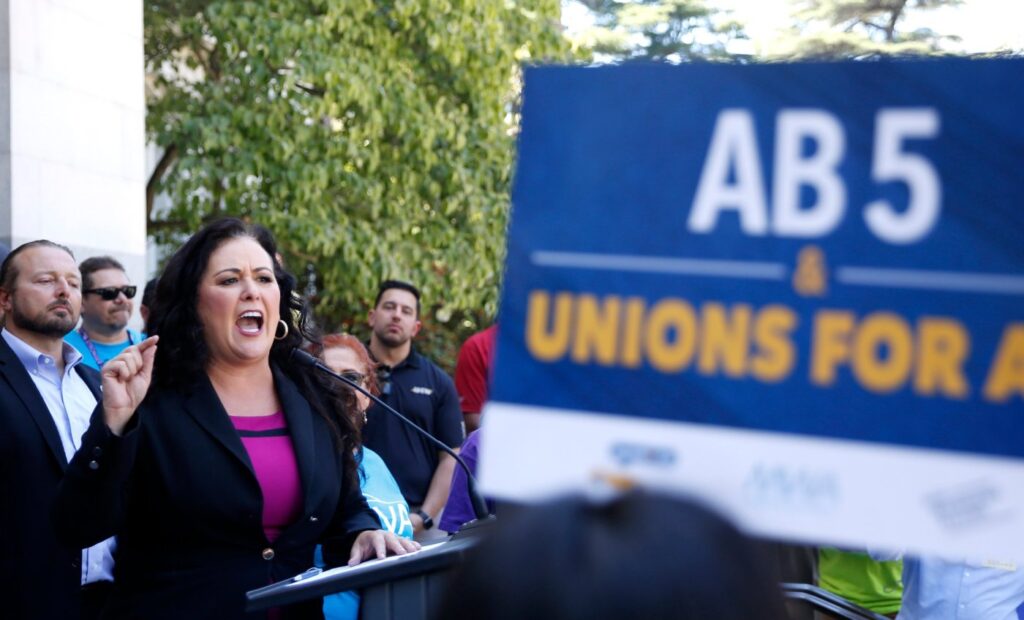
The courtroom drama of Proposition 22 has once again placed the issue of worker classification into focus.
Proposition 22 was a ballot measure that excluded app-based drivers from provisions of the infamous Assembly Bill 5 (AB 5), a law that reclassified many workers from independent contractors into employees. A trial court recently ruled to void Proposition 22 on a few legal technicalities, effectively discarding the votes of 10 million Californians. All of this will be put to the test in the upcoming Appellate Court case.
While the courtroom fate of app-based drivers is compelling, drivers are just one group of workers who are trying to cut their way out of the disastrous implications of AB 5. Freelance journalists, photographers and independent owner-operator truckers are all still battling AB 5 in the courts and have petitioned the U.S. Supreme Court to hear their respective cases.
Meanwhile, AB 5 continues to wreak havoc on hundreds of other categories of professions, with some of the most marginalized groups falling through the cracks. Fortunately, a study conducted by the California Advisory Committee to the U.S. Commission on Civil Rights may shed some light on just how destructive AB 5 has been on minorities, people of color, women, and the disabled.
Public testimony, both written and verbal, is providing a much-needed reality check to the pro-AB 5 narratives delivered by union-backed spokespersons.
Freelance sign-language interpreters, for example, say AB 5 has reduced access to essential services for the deaf-and-hard-of-hearing. The freelance transcriptionist profession in California is virtually extinct because of AB 5, hurting mostly women and seniors who dominate the field.
People with disabilities can no longer rely on independent contracting for the freedom and flexibility not available in the traditional workplace. Seniors struggle to find work due to ageism after losing their once-thriving self-employment opportunities to AB 5.
Mary Lee Behar, a California court-certified interpreter, worries about copycat legislation nationally such as the PRO Act, or attempts by the Biden Department of Labor to squash independent contracting.
“I’m a woman and a minority,” said Behar. “Limiting my ability to work and make a living by implementing this kind of law does not help the minorities that my colleagues and I serve, and it doesn’t help the minorities that are in our profession, either.”
Strippers and exotic dancers say AB 5 has devastated people of color, LGBTQ and immigrants in the adult entertainment community. Their stories are particularly stark.
“When 50% of strippers lost their work in the clubs because of AB 5, it was the black strippers including me, the disabled ones, and transgender strippers, who were the most impacted,” said Onyx Black, founder of Artists for the Revolution. “Most of us now, unfortunately, are doing survival sex work as a result. We’ve lost our businesses and we are not safe on the streets. Independent contracting was harm reduction for us.”
Another stripper, Jillian A, says AB 5 took away her ability to make a livable wage. “After AB 5 was implemented, I was paying higher house fees, I worked longer hours and made less. I got put on slower shifts and no longer had the option for a flexible schedule.”
Related Articles
One million Americans are dead of COVID
Summit of (some of) the Americas is here
Newsom (probably) can’t lose this November
Chesa Boudin’s recall and the future of criminal justice reform
Culture wars and identity politics now in America: Letters
Bamm Rose, founder of Stilettos Inc., summed it up by saying: “AB 5 is harmful to the most marginalized and beneficial to the most privileged. Marginalized people are people, not props for privileged agendas. Speaking as if AB 5 won’t harm people is a very privileged viewpoint. Systemic racism isn’t something that picks and chooses policy; it’s the entire system.”
The fallout of AB 5 is a cautionary tale that the nation must heed.
When the Commission’s project concludes this summer, they will provide their findings and recommendations to “all levels of government.” One can only hope that the hundreds of AB 5 horror stories being shared by freelancers right now are not dismissed outright, but instead amplified.
Karen Anderson is the founder of Freelancers Against AB5. She was an invited panelist at the U.S. Commission on Civil Rights recent hearings on AB 5.
